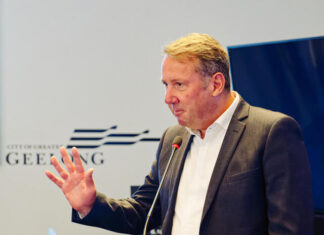Andrew Mathieson
ROBUST Lance Wiffen jumps off a docked sea trawler, muscles flexing under a tight T-shirt.
Ironically, the 54-year-old is dubbed the mussel king around the Portarlington pier for his work off the bay rather than his rippling physique.
But pulling the ropes up on a catch of mussels deep in the bay hasn’t always been the sign of the local industry’s strength.
“It’s been a boom and bust industry,” Lance ponders, sipping a coffee and looking out over the bay.
Mussels farmers like Lance were selling about 1000 tonne each in an annual harvest of 200,000 tonnes from Port Phillip Bay during a boom period leading up to 2001.
Then a sharp decline in the collection of spat, or juvenile mussels, hit hard.
“A lot of the mussel growers in the Portarlington area sold their boats and shut their farms down,” Lance recalls.
“I would say back then the commercial industry was almost coming to a close.”
With mussel farmers now producing closer to one-third of the peak figure, optimism has begun to replace empty berths along Portarlington’s harbour.
A few Portarlington mussel growers formed a consortium with Department of Primary Industries two years ago to set up a spat hatchery at Queenscliff for production and research purposes.
The initial costs and first year losses were tough but Lance is keeping his head above water amid predictions of huge gains this year.
The hope replaces an unsuccessful trial with an abalone farming company and a range of problems buying from a Tasmania hatchery.
“I have spent all my cash reserves and really we’ve struggled to come through it,” Lance says.
“If this crop is successful and we don’t get hit by a natural disaster, we should be right to continue back to expanding our growth.”
When the Victorian Govern-ment sold rights to potential mussel plots in the Port Phillip Bay in 2005, Lance bought a substantial 27-hectare plot. Most other growers were working just three-hectare plots.
Lance takes a moment to considers the plight of another grower who spent $700,000 but couldn’t grow a single mussel.
“I made it work because I had so much infrastructure already in these other areas that I was able to collect enough spat to keep me going whereas this poor bugger didn’t,” Lance laments.
“But we are a good fishing story in itself.”
Lance gave up milking the family cows on the Bellarine hills once the government decades ago phased out milk contracts with an older generation of farmers.
Lance traded handling teets for scallops, earning a good dollar.
But scallop fishing’s operations in the bay were restricted to just four days a week for nine months a year.
Quotas sometimes meant work was over by 8am and Lance’s crew would have the rest of the day to kill.
Mussel farming would keep them on the boat but was considered little more than a hobby at first.
“I started to spend more than hobby money, though,” Lance remarks.
After a good initial year, an algae bloom went right through the crop in 1988. Lance’s spending skyrocketed from $30,000 to $200,000 to recoup costs.
He was forced to jump off the boat, build a factory, buy refrigerated trucks and market the mussels, leading to the birth of his company, Sea Bounty.
Then when the good times of a decade went awry, the managing director could hear the call of the sea again.
“This was a good lesson for me being forced back out on the boat,” Lance says.
“I’ve now realised how much I actually like being out there.”
Still, the love of a good catch is sometimes tempered by the crashing waves and surety of firm land under foot, Lance admits.
“At first I was seasick on the boat,” he grins, “ and I still get sick some days now.”
A mussel man
Digital Edition
Subscribe
Get an all ACCESS PASS to the News and your Digital Edition with an online subscription
Nelson focuses on state seat
Geelong’s deputy mayor has stepped down from the position to pursue a seat in state parliament.
Seeks Liberal Party preselection in the seat of South...








